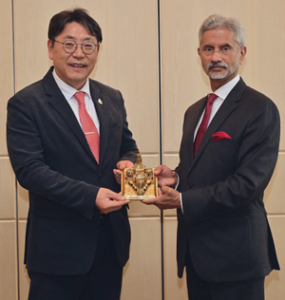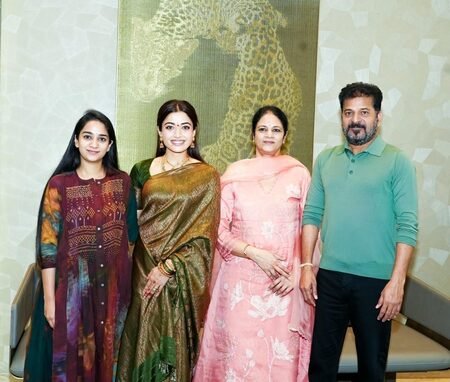
Seoul, March 6 (IANS) External Affairs Minister S. Jaishankar spoke of shared cultural heritage and longstanding people-to-people relations as he met Hong Tae-yong, Mayor of Gimhae City in South Korea on Wednesday.
Jaishankar also presented a replica of Ayodhya’s Ram Mandir to Tae-yong whom he met after addressing the opening session of the 10th India-South Korea Joint Commission meeting on Wednesday.
“Delighted to meet Mayor Hong Tae-yong today. The Gimhae-Ayodhya connect is a testament to our shared cultural heritage and longstanding people-to-people relations. Discussed greater cultural and educational cooperation with Gimhae City,” the Minister posted on X on Wednesday.
In March 2001, Ayodhya and Gimhae signed an International “Sister City” bond to encourage cultural and mutual development and established the Queen Huh Memorial Park in Ayodhya.
Legend has it that Queen Huh Hwang-ok, known as Suriratna in India, was the princess of Ayodhya before she went to South Korea and married King Kim Suro of the Karak Clan in 48 A.D.
According to the Uttar Pradesh tourism website, it is believed that she reached Korea on a boat, and was the first queen of King Suro of Geumgwan Gaya.
Around 60 lakh people of the Karak clan consider Ayodhya as their maternal home and hundreds of South Koreans visit the memorial every year to pay respects to the legendary Queen, the website said.
In his address to the Indian community in South Korea in 2019, Prime Minister Narendra Modi narrated the legend of Princess Suriratna and said that Indians “have a blood relation with Koreans”.
For the ‘Pran Pratishtha’ ceremony at the Ram temple in Ayodhya in January this year, an invitation was also extended to Kim Chil-su from South Korea, a member of the Queen Heo dynasty.
Highlighting the importance of Ayodhya to both countries, South Korean Ambassador to India, Chang Jae-Bok, said last year: “The legend about an Indian princess marrying a Korean king 2,000 years ago has an Ayodhya connection, as one of our history books has a mention of a princess from Ayuta. It is generally assumed that Ayuta was Ayodhya or Ayodhya was Ayuta.”








